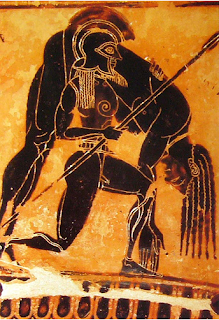
Last night I participated in something extra ordinary. Theater, military civilian relations and dialogue are three of my greatest interests and passions. I have never seen the three worlds collide. Until last night. I went to this event called Theater of War. Here's the website in case you want to know more. For the past two years, Theater of War, run by Bryan Doerries, have been touring the Western world putting on staged readings of Greek theater. Once the reading is over, they invite those affected by war (mainly veterans) to come on stage and share their reaction to the show. Act III, they invite the audience to respond with their reactions to the show. The entire event lasted three hours, which I think was too long. However I experienced a wide range of emotion last night and was quite intrigued.
One line in the staged reading Ajax by Sophocles, Tecmessa, Ajax's wife, is describing her grief as she watches her husband go through an ancient version of PTSD. She says, "twice the pain, twice the sorrow" and in that line she is referring to herself as a dependent and the pain she experiences is twice as much as her husbands. While in some ways this is not always true, there was a much larger point here that I appreciated being brought up. "Dependents", those of us affected by war through our loved ones, often experience twice the pain and sorrow as they do. It is very sorrowful and painful to go through a difficult time, but it is even more sorrowful sometimes to witness your loved one go through pain.
Anyway, the event was well organized, well executed. The actors were top notch. And the military crowd was very well spoken.
The one thing that I missed was inclusion of the civilian community. I appreciate the discussion around dependents, however even we are a small minority in the US. When it comes to military civilian dialogue, I often wonder where the civilian community comes in. Is the civilian role only to listen and validate? There was one man who voiced his concern over the reasons for going to war and while the moderator thanked him and validated him as a "concerned civilian" that was the end of the conversation. Was there no time to address these more complex issues? In the end the experience started to feel like a military propaganda production rather than one of the real hard conversations that need to happen. What if a large part of the grief experience by veterans is because they are not able to have those hard conversations about a lack of agency that they experience, that we as civilians experience. The feeling of helplessness and lack of agency is what I feel is the strong common unitor in this pain America is experiencing.
We constantly compartmentalize politics and military and often to our own detriment. As an outsider, I feel like the whole military system is set up in a way to completely abdicate authority and responsibility. Is my only role to be a cheerleader for the veterans? Is there not a bigger issue that we all face together?
3 comments:
As a fellow civilian, I wonder if the reticence within our community is due to the fact that our knowledge and experience of war is second hand, and diluted through the veterans' experience? It seems to me that in American culture, we put *so* much emphasis on the people who do go to war - look at politicians. When campaigning for office, if a candidate is a veteran, that's out in the forefront of the campaign; something to be proud of, something to be impressed by. "We should vote for him/her because s/he's been to war. S/he's seen it. he'll be a great commander-in-chief; s/he knows what s/he's talking about!" But when the opposing candidate has *not* been to war (or even enrolled in the military), it's usually one of the first absent resume items to be mocked and criticized. "You shouldn't vote for him/her because s/he has no experience. S/He doesn't know what war is like."
And I would venture to think that in an event like the one you witnessed, that other civilians voluntarily abstain from the discussion, and make their opinions, feelings, and experiences automatically less valuable. And as you say, it should be the theatre company that invites and encourages more discussion from the civilian sector to break us of this shamed silence.
Awesome post.
Thanks so much Alyssa. Your comment was appreciated. I wish I knew how to address it more thoughtfully. I know that once you say something like what you just shared to a military audience, you will see a lot of people shut down. And I dont know how to create safe enough space where that won't happen...
Well, at least in dialogue, we know that if a shut-down occurs, we have a responsibility to question publicly why the shut-down occurred. What is at the heart of it? If the group answers, then you begin to figure it out, the tough questions.
That's more difficult in the environment you were in, though, Micael, for sure.Outside of controlled dialogue, everything is scripted. Everyone has in his or her mind a script...how is this supposed to play out? Well, the veterans were brought on stage and we are supposed to honor them. Treat them as heroes. They are heroes! So do as you said, cheerlead, but anything outside of that script will cause the
OH SHIT
moment where no one knows what to do next. People are embarrassed. what is my line now???
You know, as an aside, I enjoyed your play. I wondered then (and I still wonder now) what would have happened had I sat on the metro bench in the middle.
Would there have been an OH SHIT moment for you all, or were you prepared for the script to take a different course?
Post a Comment